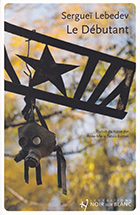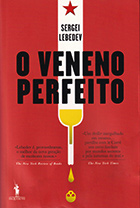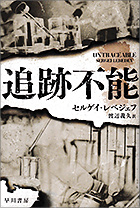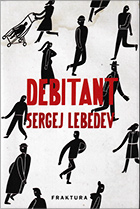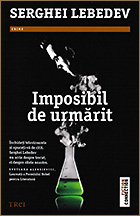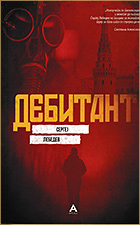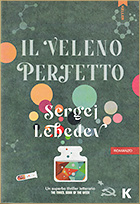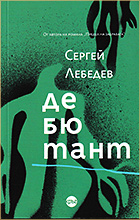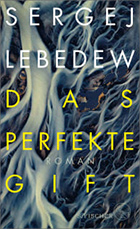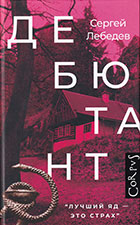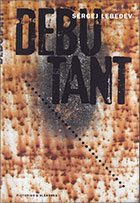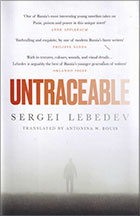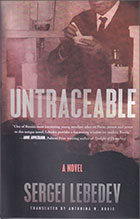Sergei Lebedev
Debutant / Untreaceable. A novel
Proposal
Rights acquired by
- Pistorius & Olsanska, Czech Republic
- Helikon, Hungary
- Creative Angel Publishing, Georgia
- New Vessel Press, USA
- Fraktura, Croatia
- S.Fischer, Germany
- Keller editore, Italy
- Claroscuro, Poland
- Corpus, Russia
- Head of Zeus, UK
- Palomar, Denmark
- Hayakawa, Japan
- Head of Zeus, UK
- Kryg, Bulgaria
- Palomar, Denmark
- Hayakawa, Japan
- Docendo, Finland
- Nilsson, Sweden
- Editura Trei, Romania
- Tänapäev, Estonia
- Antolog, North Macedonia
- Publicações D.Quixote, Portugal
„Turn off your television sets and get reading. Sergei Lebedev writes not of the past, but of today.“ (Svetlana Alexievich, winner of the Nobel Prize for Literature)
„Sergei Lebedev is a marvelous writer with two rare gifts: a nobility of style and the most precise inner vision, which allows him to see and plumb the entire depth of the anthropological catastrophe that occurred in twentieth-century Russia. Lebedev has perceived what was invisible to most Soviet and post-Soviet writers.“ (Vladimir Sorokin)
„A thriller dipped in poison … shares some of le Carré’s fascination with secret worlds and the nature of evil.“ (The New York Times)
„Immensely readable … takes the spy novel and transforms it into something akin to a political, even spiritual, allegory. The defector’s poison stands for the legacy of unresolved historical evils that now pollute the world.“ (The Financial Times)
„A taut spy thriller with Gothic flourishes … Woven into the cloak-and-dagger chase is a complex tale of memory. Failed relationships, missions and regimes haunt the novel’s characters as they do John le Carré’s … It offers not only a compelling reworking of real-life events, but an insight into the psychological effects of poisoning, literal and metaphorical, in Russia and beyond.“ (The Economist)
„Intensely topical …. The impetus of Mr. Lebedev’s steel-tipped prose, translated by Antonina W. Bouis, is to counteract erasure. The deadly poison created by the defected chemist … is dangerous because it leaves no trace in its victims. The absence of evidence makes accounts from the living, such as this courageous novel, all the more significant.“ (The Wall Street Journal)
„Lebedev writes superbly and his denouement deftly blends comedy and poignancy.“ (The Sunday Times; „Thriller of the month”)
One fine summer day, an elderly gentleman, a Russian émigré, dies in the garden of a bustling restaurant in a small European town. Regular customer Vyrin, or Mr Mikhalsky according to his passport, has always avoided areas where the view is impeded. On that day, however, the only place free was an end table by the hedging. The sudden injection feels just like a bee sting, but Vyrin turns round to see a man getting into a car with a non-local number plate. He realises that after almost thirty years the avenging sword of the Russian secret services has finally caught up with the fugitive traitor. From his days working in intelligence, he knows how many documents will have been filed away, capturing every movement, the entire life of a surveillance target. „Now that he had tasted a new life in a free country, it felt as though in the old days he had been reading an authorless paranoid novel, a text of texts written by the fanatical state memory machine. But this time he was the one they were hunting down.“ In the nineties, Vyrin gave a statement to the police investigating the commercial ties of his former colleagues, the shell companies, siphoning of funds and money laundering. His total change of appearance, the reclusive lifestyle, the plastic surgery and the new biodata have clearly been of no avail. They have managed to track him down. In his final minute of life, Vyrin manages to whisper to the waiter, „˜This is an assassination. They’ve poisoned me.“
The case would have been closed without further investigation had the waiter not been an ex-police officer; after all, there is no telling who might be allergic to bee stings, and especially at Vyrin’s age. Much to the chagrin of the two Soviet-era generals following the events from Moscow, the pathologists find traces of a mysterious highly toxic poison. Three of the international chemical warfare experts called in to investigate are well-known to the generals. But as for the fourth … Was it not that same scientist Kalitin, inventor of the deadly chemical agent codenamed Debutant? A defector, traitor and a dangerous enemy who knew too much. It was high time they got rid of him. And the very next day two special-ops professionals board a plane.
Lebedev makes masterful use of the devices of thriller and spy-novel writing, with their help leading his readers into the wilderness of the human soul, travelling along such untrodden paths of history that you cannot but marvel when the fast-paced story mutates into a journey to purgatory. The past always finds echoes in the future, which is why events in today’s world are interwoven with century-old history. The recent killings and attempted assassinations in England also make an appearance: a poison-tipped umbrella, spiked tea, a bottle of perfume. But this is only the tip of the iceberg, those rare cases that happen to make the headlines.
The author spent long days in the archives tracing the history of the clandestine chemical warfare programme. The Russian KGB archives remain closed to this day, but the archives in some of the former Soviet republics have been declassified, in particular the Special Archive of Lithuania, which contains some of the most important KGB documents both at the Soviet and republican level, pertaining among other things to the suppression of dissent and top-secret KGB operations.
It was not, however, the world-shaking stories of Litvinenko’s death and the Skripal poisonings that served as the inspiration for this novel. Just as Goethe once did, the author is trying to understand what makes a man violate the most sacred thing of all: Life. Lebedev’s Debutant is the story of a modern-day Faust who has sold his soul to the devil.
The novel’s main protagonist Kalitin spends his childhood and youth in the city of Sovetsk-22, which does not officially exist on any maps or in any directories. On a site in the desolate taiga the dwellings and institute buildings had sprung up almost overnight: a city fenced in with barbed wire and suffused in an atmosphere of total secrecy – with no post offices, no telephones, no television. Little Kalitin realises that his parents are mere hostages of this city, having been lucky enough to find shelter in it from Stalin’s repressions. They are weak people, frozen with fear. But there is also the all-powerful Uncle Igor, the „lord“ of the city and owner of a mysterious uniform with a serpent twined around a chalice. Owing to him, Kalitin becomes a chemist and Uncle Igor’s most devoted disciple.
Through the patronage of his Mephistopheles, Kalitin later lands on the Island, which does not exist on any maps either. It was once the site of a monastery, and sometimes Kalitin is even rather spooked by the remains of ancient frescoes depicting the Last Judgment. The monks were expelled after World War I and the Revolution, and the Island became the ideal site for a secret military range where Soviet and German scientists could conduct joint chemical weapons testing. One of them, Klaus, who during World War II delivered death on a conveyor belt in a concentration camp, was saved by Uncle Igor and sent back to the island. As it turns out, this enemy, who might even have been the killer of his relatives who died in the camps, becomes the person Kalitin understands the best and grows closest to. Both of them are obsessed with one idea: the idea of the „perfect“ death.
It becomes Kalitin’s mission in life to find a drug that can kill instantly and perfectly, leaving no trace. He ‘was creating a new kind of death: one that was rational and surgically precise, and the morality and propriety of which lay in its selectivity’. Kalitin remorselessly kills thousands of mice, hundreds of dogs, rabbits, monkeys (see sample translation 1), dozens of horses, goats and sheep – ‘but it was necessary in the service of a great cause.’ He is also supplied with the most valuable guinea pigs of all: criminals against the state sentenced to death, the living corpses known as the ‘mannequins’. He does not think of them as human, he is untouched by their torment; all he cares about is figuring out the secret of why the drug acts so inconsistently on the test subjects. He wants one thing alone: to achieve perfection, the immaculate death, eluding the efforts of the forensic pathologists.
And, like Goethe before him, Lebedev is trying to understand what motivates a man who has lost all sense of right and wrong. Kalitin’s wife Vera dies during testing of the latest drug. ‘Debutant was so hush-hush that Vera’s body could not be taken to the hospital morgue. She had been touched by Debutant – and now she had become a vessel, a receptacle for the secret. The autopsy showed there were no traces of the substance. Kalitin’s hypothesis had been confirmed. Debutant was untraceable.’ His colleagues console him, but he is exulting in his victory. Finally the formula for the perfect killer has been discovered. ‘Vera had wanted a child. Although she’d guessed, of course, that he could only ever have a single child: one born in the test tube of his laboratory.’
In 1991, Kalitin has just a few months left before they begin the large-scale production of his brainchild. But suddenly they are facing delays in wages and equipment, the supply of the ‘mannequins’ dries up and there is talk of disarmament and the conversion of military resources to civilian purposes. At this point, Kalitin experiences the dull, bewildering sensation of crushing calamity. He has no life outside the lab, and he absconds to the West, making off with his child Debutant in a special container disguised as a bottle of cologne.
Some years later, Kalitin realises his myopic mistake. He had dreamed of continuing his work, of shiny laboratories, and instead, after the endless interrogations and screening (the only thing Kalitin kept quiet on was Debutant and the experiments on the ‘mannequins’), he is ‘given nothing but a measly, albeit well-paid, role as a freelance consultant on chemical weapons investigations. He realises he has simply been slickly discarded, as if he was a chemical hazard, an infected object. In the final analysis, it was much cheaper to pay his wages, to keep him under control, than to do battle around the globe with the monsters he might produce.’
And so, after a long search, Kalitin settles on the outskirts of a small German town near a forest and in the vicinity of a small church where the pastor is a man with a hideous scaly-skinned face. Kalitin greets his neighbours affably, but he does not strike up friendships.
One day on a train, leafing through a newspaper out of boredom, Kalitin stumbles across an article on the death of a Chechen field commander whom the secret services have been pursuing for years. Thanks to the journalist’s detailed account, Kalitin realises that the murder weapon was the prayer beads and the symptoms of death indicate the poison was one of the precursors to Debutant. So Kalitin’s work has not been in vain: the drug is in the right hands, and a team of experts is working with it. ‘From that moment on, Kalitin pored over the newspapers, searching for the hidden clues that would be missed by the uninitiated, watching as the substances from the various chemical classes and families turned up in the case, sometimes identified by the investigators and sometimes not. They were behind the seemingly disconnected random deaths, accidents and assassination attempts; to an expert eye, to a man in the know the mask of death was plainly discernible on the faces of the journalists, the politicians, the defector spies. Kalitin would recognise his competitors’ drugs – and also his own. He felt something new and evil had begun: an orgy of dark deeds, a binge that had not been seen in a long time. ‘“Their time had come, it had finally arrived,” Kalitin gloated to himself. “Who could they have taken out in ’91? You cannot poison an entire crowd. There is no way to crack down on something that has no centre. But now that solidarity had gone, and all that remained were isolated individuals, players who were instinctively crippled with fear … drugs were the optimal solution.”’
Now that the doctors have diagnosed his cancer, giving him no more than a year to live, Kalitin decides to cheat fate. There is no shortage of dictators in the world – North Korea for a start – who would not only gladly throw open the doors of their institutes and lend him, as the discoverer of the perfect death, their finest specialists, but who would also assemble their finest doctors to save him from death.
For a long time, Pastor Travnichek has kept an eye on his neighbour. As the son of an ardent Nazi, he has a keen sense for evil and is able to sniff it out; after the Wall went up, he sought sanctuary in the church, hoping to find salvation in piety. The perspicacious pastor guesses that Kalitin is not who he claims to be. But now his mysterious neighbour is in danger: it is not hard for the pastor to deduce the occupation of the men arriving at his neighbour’s house, and so he offers Kalitin refuge in his church. Their candid conversation by night is yet another echo of Goethe’s Faust.
For many years before the Wall came down, they had tried to make the pastor turn informant, wanting to get him to violate the sacrament of confession and report on his parishioners. But he continued to distribute forbidden samizdat literature and to read sermons that some of the churchgoers recorded on cassette and that were even broadcast on radio from the other side of the Wall. Then they tried to poison him, but they only succeeded in disfiguring his handsome face. (See sample translation 2.) Kalitin the chemist immediately realises which chemical was used against the pastor. ‘He was sitting in front of a living corpse. Neither emergency stomach pumping nor a blood transfusion could save you from that drug. There were no antidotes. Kalitin knew this as well as he knew two plus two was four.
‘His mind, his firm, rational world, had cracked. Something unknown was peering into the crack …’
‘Travnichek was a living miracle who had inked out Kalitin’s fate, making Debutant meaningless and irrelevant. He had sought absolute power over matter, and that absolute was destroyed. Kalitin tried to convince himself Debutant would have killed the priest – and he sensed that the irrationality of the miracle was higher than all his thoughts, computations and calculations.
‘He had been defeated; mortal hatred welled up in him. Kalitin wanted to kill the priest; he had at his fingertips the only weapon left. And so Kalitin began whispering, intoning to the pastor all the blackest, most evil things that had occurred with him – his very life itself; pouring it into Travnichek like a poison. Kalitin could not stop, he opened up as though he was uncorking phials and ampoules, all the dark recesses of his past, he was shouting without realising it, all so that the miraculous pastor would choke to death on the venomous revelations, so he would die like the mice and the dogs, the monkeys and the people, like Kazarnovsky and Vera, to die the death of the beasts. A death without miracles.’
